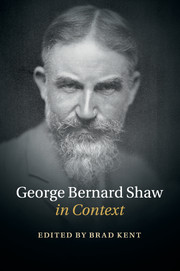Book contents
- Frontmatter
- Dedication
- Contents
- List of illustrations
- Notes on contributors
- Preface
- Acknowledgements
- A Chronology of Shaw's Works
- List of abbreviations
- PART I PEOPLE AND PLACES
- PART II THEATRE
- PART III WRITING AND THE ARTS
- 15 Cinema
- 16 Journalism
- 17 Letters
- 18 Media and technology
- 19 Modernism
- 20 Music
- 21 Novels
- 22 Publishers and publishing
- 23 Visual arts
- PART IV POLITICS
- PART V CULTURE AND SOCIETY
- PART VI RECEPTION AND AFTERLIFE
- Further reading
- Index
- References
20 - Music
from PART III - WRITING AND THE ARTS
Published online by Cambridge University Press: 05 October 2015
- Frontmatter
- Dedication
- Contents
- List of illustrations
- Notes on contributors
- Preface
- Acknowledgements
- A Chronology of Shaw's Works
- List of abbreviations
- PART I PEOPLE AND PLACES
- PART II THEATRE
- PART III WRITING AND THE ARTS
- 15 Cinema
- 16 Journalism
- 17 Letters
- 18 Media and technology
- 19 Modernism
- 20 Music
- 21 Novels
- 22 Publishers and publishing
- 23 Visual arts
- PART IV POLITICS
- PART V CULTURE AND SOCIETY
- PART VI RECEPTION AND AFTERLIFE
- Further reading
- Index
- References
Summary
How Bernard Shaw sang like a bird all through his Dublin childhood; how by age ten he could whistle from end to end leading works by Handel, Haydn, Mozart, Beethoven, Rossini, Bellini, Donizetti, and Verdi; how, edging toward seventeen, he extended his interests to include instrumental music by teaching himself to play piano transcriptions – these reminiscences will be familiar to readers of his late Preface to London Music written in 1935 (SM I: 29–60). Just as important was his negatively noteworthy discovery – after moving to London in 1876 and receiving lessons from his mother, an accomplished mezzo – that his ‘uninteresting baritone voice’ (SM I: 45) would serve to entertain no one but himself.
As a newly arrived émigré, Shaw began ghosting musical notices, bearing hints of ‘Shavian’ style, for The Hornet, a satirical magazine; but this occupation, such as it was, ended in 1877. After writing five novels and then serving as regular art, book, and sometime concert reviewer, he lucked into becoming Corno di Bassetto, musical columnist for The Star, in February of 1889. From that heady niche he resigned in May 1890 to don the mantle of G.B.S. (his final moniker) for The World, where he continued a weekly column until ending his career as professional music critic in August 1894. These accumulated labours, summing to roughly a million words, might have marked an enviable lifetime's work; but in fact Shaw, barely turned thirty-eight, was already on the way to his culminating vocations as theatre critic and as yet unheralded master dramatist. Through many later shifts in interests and emphasis, one foundational truth held: ‘Music has been an indispensable part of my life’ (SM I: 57).
During the late-Victorian period, there were at least a half-dozen journals in London devoted entirely to music – the best known of which, The Musical Times, had begun in 1844 and continues to the present day. There were also magazines of general interest (The Athenaeum, The World) that included substantial sections on music, as well as prominent newspapers (The Daily Telegraph, The Pall Mall Gazette) that paid serious attention to classical performances.
- Type
- Chapter
- Information
- George Bernard Shaw in Context , pp. 160 - 167Publisher: Cambridge University PressPrint publication year: 2015



